April is Fair Housing Month: A Legacy Worth Protecting
April is Fair Housing Month, a time to reflect on the legacy and impact of the 1968 Fair Housing Act. Passed shortly after the assassination of Dr. Martin Luther King Jr., this landmark legislation was designed to eliminate housing discrimination and promote inclusive, equitable communities across the nation. Fair housing initiatives don’t just benefit individuals—they help build stronger, more stable neighborhoods. When everyone has access to safe and affordable housing, communities see improvements in health, educational outcomes, economic opportunity, and civic engagement. Fair housing policies are a foundational part of creating a society where everyone has the chance to thrive, regardless of race, gender, family status, disability, or other protected characteristics.

Challenges to Enforcement and Access
Despite the progress made, the mission of fair housing remains unfinished. In 2025, enforcement mechanisms and policy protections are facing significant pressure. Reductions in federal support and changes to key regulatory frameworks have raised concerns among housing advocates and civil rights organizations. For example, significant proposed cuts to nonprofit funding—groups that handle nearly 75% of the nation’s approximately 34,000 annual fair housing complaints—could limit access to legal support and advocacy. Additionally, the Department of Housing and Urban Development (HUD) has indicated plans to reduce its Fair Housing and Equal Opportunity division staff by over 75%, potentially leaving only around 120 investigators nationwide to manage fair housing complaints.
Legal Challenges and Continued Advocacy
In response, organizations like the National Urban League and the National Fair Housing Alliance have launched legal challenges to preserve protections they argue are vital to ensuring equal access and opportunity. These lawsuits underscore the importance of civic vigilance and community engagement in defending the principles of the Fair Housing Act.
Recent years have also seen the rollback of significant fair housing policies. The Affirmatively Furthering Fair Housing (AFFH) rule—which required local governments to take proactive steps to address segregation in order to receive federal funding—was rescinded. Executive Order 14168 has altered enforcement related to gender identity discrimination in federally funded shelters, raising concerns about access for transgender individuals.
Looking Ahead
Looking further ahead, there are growing concerns about proposals to privatize key housing programs and reduce the federal government’s role in ensuring access to affordable housing. Shifting these responsibilities to the private sector could limit accountability and prioritize profit over people, resulting in fewer safeguards for vulnerable populations. While low-income households would be most immediately affected, the ripple effects could be felt across the wider community. Reduced housing stability can lead to increased homelessness, strain on local social services, and rising housing costs for middle-income families. Without strong public oversight, entire neighborhoods may experience greater economic segregation, underinvestment in infrastructure, and diminished educational and health outcomes—challenges that ultimately impact everyone, regardless of whether they belong to a protected class.
Our Commitment
While the landscape may continue to shift, our commitment to the values of the Fair Housing Act remains steadfast. Everyone deserves access to safe, stable, and equitable housing, and we will continue to support policies and practices that reflect that belief. Our clients can count on us to stay informed and supportive, every step of the way.
More Resources
- Books on Fair Housing
- U.S. Department of Housing and Urban Development
- Fair Housing St. Louis County
- Metropolitan St. Louis Equal Housing & Opportunity Council
Sources: Shriver Center on Poverty Law, AP News, NPR, The American Prospect, The Washington Post. Politico, National Fair Housing Alliance, Shelterforce, Time, Wikipedia, Reuters



